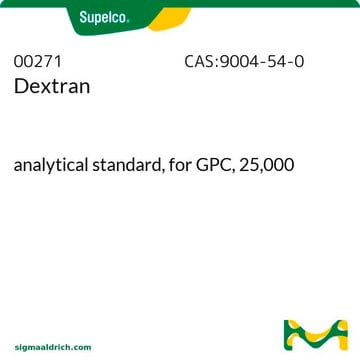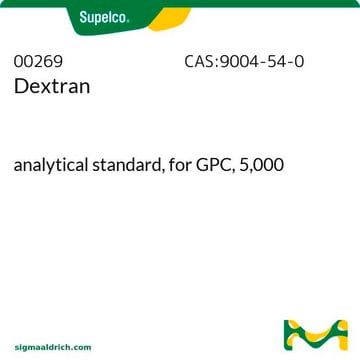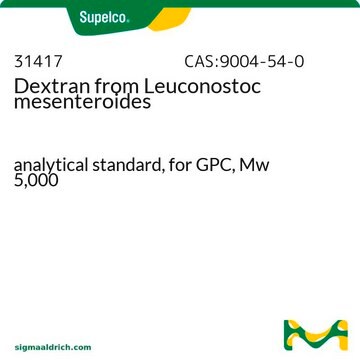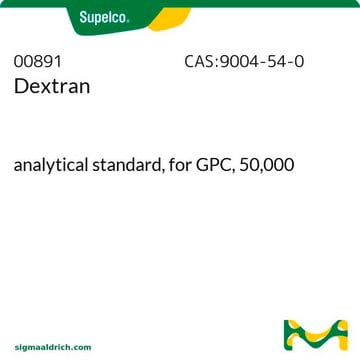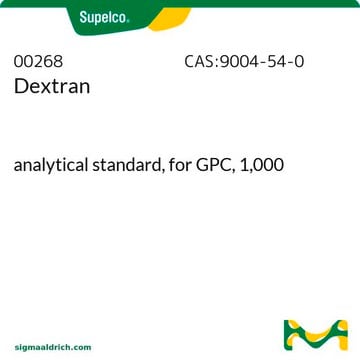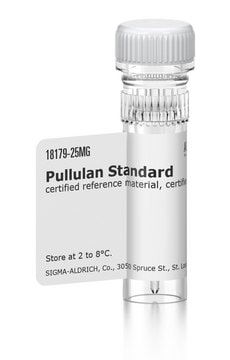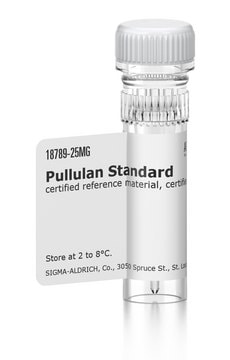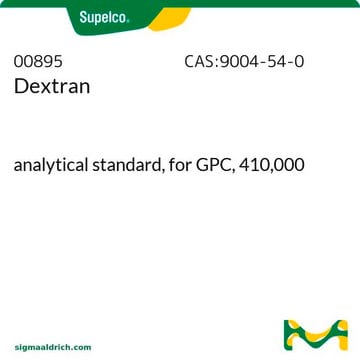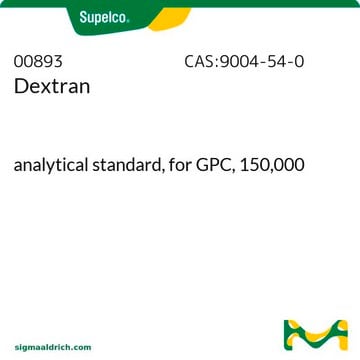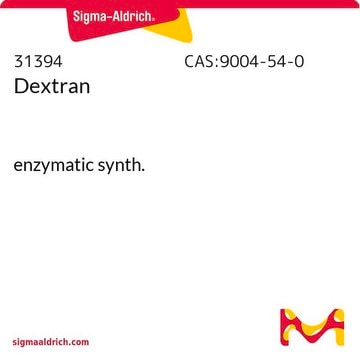31430
Dextran
analytical standard, for GPC, Set Mp 1,000-400,000
Sign Into View Organizational & Contract Pricing
All Photos(1)
About This Item
Linear Formula:
[C6H10O5]n
CAS Number:
EC Number:
MDL number:
UNSPSC Code:
41116107
NACRES:
NA.24
Recommended Products
grade
analytical standard
for GPC
Quality Level
mol wt
Mp 1,000-400,000
analyte chemical class(es)
oligosaccharides
technique(s)
gel permeation chromatography (GPC): suitable
application(s)
food and beverages
format
neat
InChI
1S/C18H32O16/c19-1-5(21)9(23)10(24)6(22)3-31-17-16(30)14(28)12(26)8(34-17)4-32-18-15(29)13(27)11(25)7(2-20)33-18/h1,5-18,20-30H,2-4H2
InChI key
FZWBNHMXJMCXLU-UHFFFAOYSA-N
Looking for similar products? Visit Product Comparison Guide
General description
Dextran is an exopolysaccharide synthesized by lactic acid bacteria from sucrose. It consists of repeating units of D-glucose with the monomers joined to each other through α-1,6 linkages. In addition, the linear D-glucose chains show branching at frequent intervals, linked by α-1,4, α-1,3, or α-1,2 linkages.
Application
The analytical standards can also be used as follows:
- High-performance size exclusion chromatography (HPSEC) based determination of the molecular weight of a dextran synthesized by Leuconostoc citreum B-2, isolated from a fermentation product of pineapple
- Determination of molecular weight of polysaccharides obtained from four Auricularia species by high-performance liquid chromatography using a water-soluble gel column
- Identification of molecular weight of a water-soluble polysaccharide isolated by anion exchange chromatography from the dried leaves of C. paliurus by gel permeation chromatography (GPC)
- Gel permeation chromatography (GPC) based molecular weight measurement of a dextran produced by two strains of Leuconostoc mesenteroides
- Estimation of molecular weight of a water-soluble polysaccharide obtained from thinned-young apple by high-performance size exclusion chromatography (HPSEC)
Components
set contains 10 different dextran standards with 500 mg with Mp ~1,100 (Cat. No. 31416), ~4,400 (Cat. No. 31417), ~10,000 (Cat. No. 31418), ~20,000 (Cat. No. 31419), ~45,000 (Cat. No. 31420),~65,000 (Cat. No. 31421), ~125,000 (Cat. No. 31422), ~195,000 (Cat. No. 31423), ~275,000 (Cat. No. 31424), ~400,000 (Cat. No. 31425); The components can also be ordered separately under the product numbers indicated.
Storage Class Code
11 - Combustible Solids
WGK
WGK 2
Personal Protective Equipment
dust mask type N95 (US), Eyeshields, Gloves
Choose from one of the most recent versions:
Already Own This Product?
Find documentation for the products that you have recently purchased in the Document Library.
Customers Also Viewed
Jie Yu et al.
Molecular human reproduction, 20(3), 260-270 (2013-11-26)
Accumulating evidence indicates that reduced fecundity associated with endometriosis reflects a failure of embryonic receptivity. Microdomains composed of endometrial gap junctions, which facilitate cell-cell communication, may be implicated. Pharmacological or genetic inhibition of connexin (Cx) 43 block human endometrial cell
Erik C B Johnson et al.
Molecular neurodegeneration, 15(1), 53-53 (2020-09-15)
Alzheimer's disease (AD) is the most frequent and costly neurodegenerative disorder. Although diverse lines of evidence suggest that the amyloid precursor protein (APP) is involved in its causation, the precise mechanisms remain unknown and no treatments are available to prevent
Mingshu Sun et al.
International journal of immunopathology and pharmacology, 30(3), 227-237 (2017-01-31)
Systemic inflammation is involved in vascular calcification and cardiovascular disease which is the leading cause of mortality in rheumatoid arthritis (RA). A high level of serum interleukin (IL)-6 plays a key role in local and systemic inflammation in RA. However
Fangwei Gu et al.
The Plant cell, 28(7), 1722-1737 (2016-06-30)
In plants, the presence of a load-bearing cell wall presents unique challenges during cell division. Unlike other eukaryotes, which undergo contractile cytokinesis upon completion of mitosis, plants instead synthesize and assemble a new dividing cell wall to separate newly formed
Yoan Arribat et al.
The Journal of clinical investigation, 129(12), 5312-5326 (2019-09-11)
Growing evidence shows that alterations occurring at early developmental stages contribute to symptoms manifested in adulthood in the setting of neurodegenerative diseases. Here, we studied the molecular mechanisms causing giant axonal neuropathy (GAN), a severe neurodegenerative disease due to loss-of-function
Our team of scientists has experience in all areas of research including Life Science, Material Science, Chemical Synthesis, Chromatography, Analytical and many others.
Contact Technical Service
